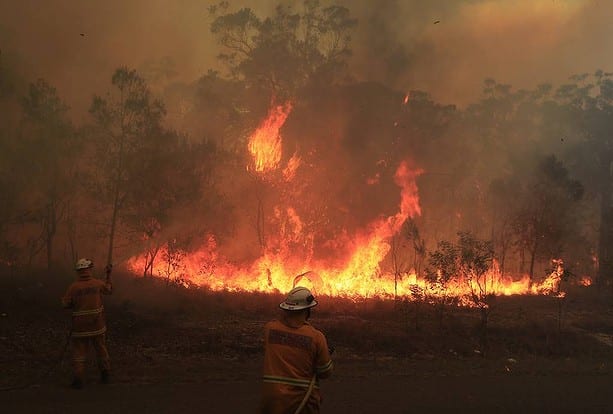We need to talk.
It’s easy to understand why there’s widespread support for politicians and others who argue we shouldn’t talk about climate change in the middle of a bushfire emergency.
When you’re fighting to keep your house, grieving over the loss of a loved one or putting your life on the line to protect others lives and property, people talking about climate policy or how these kinds of events will become more common and more severe is very uncomfortable.
This very human response should be understood and people who are suffering loss, or fear of it, should be treated with sensitivity. That’s an argument about how we talk about it, but certainly not a reason to avoid doing so. This is actually the perfect time to talk about climate change and about climate policy – it couldn’t really be better.
People don’t like talking about uncomfortable things. It makes us feel, well, uncomfortable. The thought that major bushfire emergencies in spring could become more common, with people dying and houses and communities being destroyed, is very uncomfortable. The fact that we in Australia are making a disproportionately large contribution to the problem by polluting more per capita than any other developed country and now plan a massive expansion in our coal exports which, when burnt, will make climate impacts worse around the world, is particularly uncomfortable. But it’s still true.
That’s why, right now, in the middle of a scary, hard to control bushfire emergency that threatens homes and lives is exactly when we should talk about it. Right now, while we’re paying attention to the reality of our pollution’s results, rather than thinking about it as some long-term global risk we can emotionally detach from. Right now, while we’re facing climate change for what it is – an expensive, disruptive, dangerous risk to our quality of life. A risk that we are actively contributing to making worse.
Members of Tony Abbott’s new conservative government, including Cabinet ministers, have been strident in their attacks on those who raise this connection. This is unsurprising given they have a lot to lose if people accept it.
Of course no one can blame the government for these bushfires nor draw a direct causal relationship between any particular fires and climate change. But this is one of NSW’s worst bushfire emergencies, referred to by state fire fighters as “unparalleled” given the season, with a state of emergency declaration allowing authorities to forcibly remove people, cut electricity and water supplies, and demolish buildings. Sure, we’ve always have bad fires but with one this big, in the middle of spring and coming after Australia’s hottest ever September, you would, to use a great Australian phrase, have to be a “flaming drongo” (complete idiot) not to be wondering about the connection. Especially given the science is so clear.
That’s why Tony Abbott’s government doesn’t want us to talk about it. Everyone knows the new government is resisting action on climate change. But politicians here can’t say that. Unlike America, where climate denial is a badge of pride for conservatives, in Australia they have to take a subtler line. The Australian public accepts climate science and believes the world should act. So our conservative politicians have to say they accept the climate science (even when they don’t) then argue that Australia should act slowly and cautiously and not before the world does – in other words say the right things but don’t take much action. Well, except to dig up and sell as much coal as we can before the world wakes up to our game.
That’s why linking climate and fires is scary territory for conservative politicians. It’s hard to overstate how iconic and powerful bushfires are in the Australian psyche. They bring out the best in us. Courageous, mostly volunteer fire-fighters risk their lives to protect others and are correctly seen as heroes. The tragedy of fires brings communities together and we open our hearts and wallets to those affected in these all too regular fire events that symbolise summer. So connecting politics to this iconic Australian symbol is both dangerous and alluring. Observe for example the conservative shock–jock Neil Mitchel who, while attacking those who link fires and climate change this week tried to side with the heroes, saying “This is one of those times we pull together and when the Australian spirit famously shines through….. I remember the spirit that builds around times like this. It is magnificently Australian.”
So let’s be clear, the resistance from conservative politicians and commentators to linking climate change and fires is not just driven by compassion for those suffering loss. It is the manipulative politics they’re accusing others of. As the old quote goes “Hell hath no fury like a vested interest disguised as a moral principle.” If the public learns to relate natural disasters that go to the heart of the Australian psyche, like fire, drought and flood, to climate change – those who resist strong climate policy will be in serious trouble. So will their policies promoting the massive expansion of coal mining.
But perhaps the most important reason for talking about climate change and bushfires is so we end our denial of what’s to come. Mega fires in spring, as we’re facing this week, are indicative of the future we face and we have some important choices to make. Firstly, we must decide to get ready for a lot more angry summers – these are now inevitable. They’re going to be tragic, expensive and disruptive and the sooner we get our heads around that the better of we’ll be. Given what’s coming we should all be running raffles and fundraising BBQ’s for our volunteer fire fighters. We’re going to need them to be well resourced, appreciated and numerous. And we’re going to have to think differently and creatively about how we reduce the risk, as well argued by Professor Peter Bowman from the University of Tasmania. Secondly we have to decide what side of history we want to be on in Australia. Are we going to be the country that that sold the coal that helped drive the climate into chaos or the ones who woke up in time and changed our ways. That’s the conversation we need to have and the middle of bushfire emergency is the ideal time to have it. So let’s talk.







